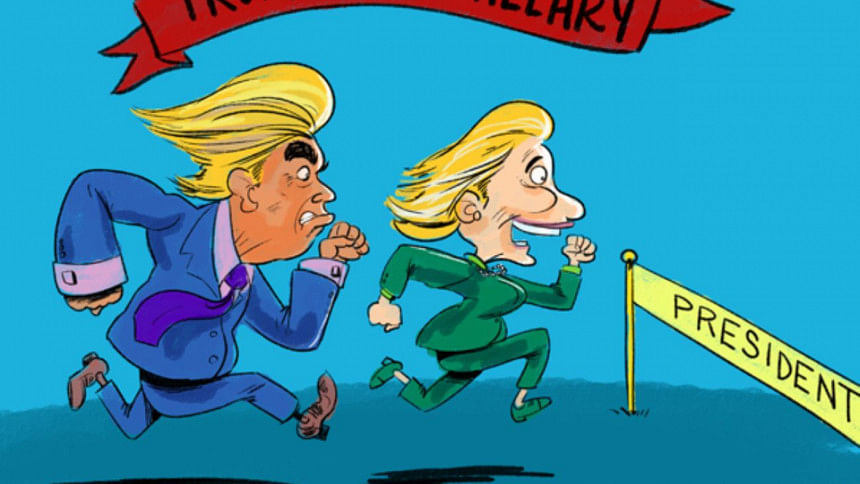Hillary-Trump slanging matches from the ringside

ONLY a month ago, one would have thought that Hillary Clinton could have a cake walk to the White House as the next Democrat President of the United States of America. But in the last two weeks or so, Trump has gained from the rear, bridging the gap with Hillary. Where the ex-secretary of state only four weeks back was 8 to 12 percent ahead in public support from her Republican rival, they are now running neck-to-neck.
Even so, most pundits argue that regardless of fluctuations in the public opinion, at the end of the day, electoral votes will have the last word. Thus, a foundational check and balance has been introduced into the election to the office of the US presidency. Based on an electoral college system, a candidate must clinch at least 270 electoral votes to secure victory.
Many wise hats would much rather err on the side of caution: In the states of Ohio, Iowa and Florida, where Trump was deemed to be trailing behind Hillary, he seems to have edged ahead lately.
"A week is too long for politics," Harold Wilson, a former British Prime Minister, had once said, given the highly mercurial political barometre of his times. It warns against dilly–dally in politics that could make potentially effective options slip away, being overtaken by intrusive of distraction, if not worse.
If, however, that was a benchmark for being in step with the pace of politics five decades ago, what could be the benchmark for intensification of the US presidential election campaigns in this cyber age? Already, some six weeks have passed since the post-primary selection of candidates; and this has brought in some highly charged, even no-holds-barred incendiary elements to the electoral discourses across a broad spectrum. If this is the foretaste of things to come in the remaining run–up to the election, we are staring at an exciting, edifying little- less –than six weeks of the US high drama with the world's eyes transfixed on it.
Meanwhile, we have had a rather premature assurance from Nisa Desai Biswal, the US Assistant Secretary of State for South and Mid-Asia Region: Whoever comes to power in the US presidential election, there will be 'no change in their foreign policy'; and furthermore, she thinks it will also have no impact on US-Bangladesh relations. It is good to hear that the US values Bangladesh's socio-economic successes, its prospects, and its commitments to fight extremism.
She obviously gave the assurance, sensing some apprehensions that the poll result may alter the scenario for better or worse for Bangladesh. How much of what she says is rhetoric and how much will be proved in kind, one has to wait and watch which way it pans out. But insofar as we are concerned, we are not looking for just status quo but improvement in specific areas.
Next Monday, we will see the first of the three debates that are billed to bring out the best in the two candidates' competency, knowledge, leadership qualities and abilities to defend their policy positions, plans and visions for their incumbency.
The principal issues to be debated are clear-cut and what's more, they are live raring to be addressed: National security, terrorism, immigration and trade. The first two have come to the fore, one might say, in a tale-tell coincidence and at a wrong time for the Democrat platform. On a closer look, it is as well that these have come about to be testing the rationality of the candidates' stance on the subject.
After the Orlando carnage, bomb attacks in New York and New Jersey will be ammunition in the hand of Trump against his opponent. Trump blames it out on "weak policies" of the Obama administration, including on gun control. Hillary counters her adversary, saying that he is inciting ISIS. But the killing of another Black person by the police and the hurting of a protester have racial overtones that play out against Trump.
The connection between immigration and terrorism is over-simplistic on Trump's part as his threat of a 'trade war' with China has earned him "F" credit in economics from Nobel laureate economist Joseph Stiglitz.
The writer is a contributor of The Daily Star.

 For all latest news, follow The Daily Star's Google News channel.
For all latest news, follow The Daily Star's Google News channel. 



Comments